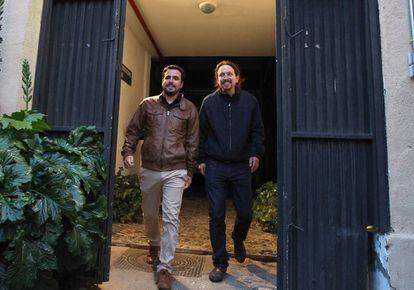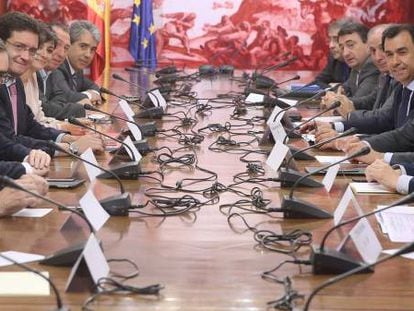Spain’s Socialists and new leftist group fight to attract middle-aged vote
Polls show fight for progressive support in June 26 elections will target 35-to-54 age bracket


The new alliance between Spain's anti-austerity Podemos and the Communist Party-led United Left (IU) federation will focus on attracting middle-aged voters who traditionally have supported the Socialist Party (PSOE), a new poll shows.
A Metroscopia survey suggests that Socialist leader Pedro Sánchez will have a fight on his hands to retain voters in the 35-to-54 age bracket in the repeat general election to be held on June 26.
Socialist voters aged 55 and over remain largely loyal to their party, while younger supporters appear to be attracted by the new leftist coalition promising to bring change to Spain.
There is an age divide. The more adult vote belongs to the Popular Party (PP) and to the PSOE. The younger vote belongs to the emerging parties
Ángel Valencia, political science professor
“Among 35-to-54-year-old voters, IU has a direct voting intention of 8.1%, which is very significant, because the battleground with the Socialists lies in this middle-aged range,” says Marcos Sanz, a senior researcher at the polling firm. “That will be a substantive contribution in a dead heat that could be won by a small margin.”
If that were to happen, the Socialist Party (PSOE) could lose its power over the Spanish left just two years after the emergence of Podemos on the Spanish political scene.
“The coalition [between Podemos and IU] is not just about numbers – it also completely changes the structure of the left,” says Ángel Valencia, a lecturer in political science at Málaga University. “There is an age divide. The older vote belongs to the Popular Party (PP) and to the PSOE. The younger vote belongs to the emerging parties.”
Sign up for our newsletter
EL PAÍS English Edition has launched a weekly newsletter. Sign up today to receive a selection of our best stories in your inbox every Saturday morning. For full details about how to subscribe, click here.
Most polls show that voters in Spain's big cities aged between 18 and 34 overwhelmingly prefer Podemos and the center-right Ciudadanos, the other main challenger to emerge from the inconclusive elections of December 20. Meanwhile, the PP and PSOE continue to dominate in rural areas and among voters aged 65 and over.
The United Left has been around since the mid-1980s, but it has never established a significant presence in Congress.
Lower turnout
Experts agree that voter turnout at this new election will be lower than the 73.2% recorded in December. What's more, the 55-and-over age group represents 40% of all voters, and they also turn out to vote most consistently. And on June 26, for the most part, they will not be voting for the emerging parties.
When Podemos number two official Iñigo Errejón recently posted a photograph of a new 91-year-old party member, proudly stating “this is the kind of picture that gives meaning to it all,” he knew that this age group is in fact lost to Podemos. According to a poll by the Center for Sociological Studies (CIS), 63.5% of voters aged 65 and over will never vote for Podemos.
Because their chances of overtaking the PSOE lie in the middle-aged vote, the contribution by IU, which earned a million votes at the last election, could be crucial.
English version by Susana Urra.












































